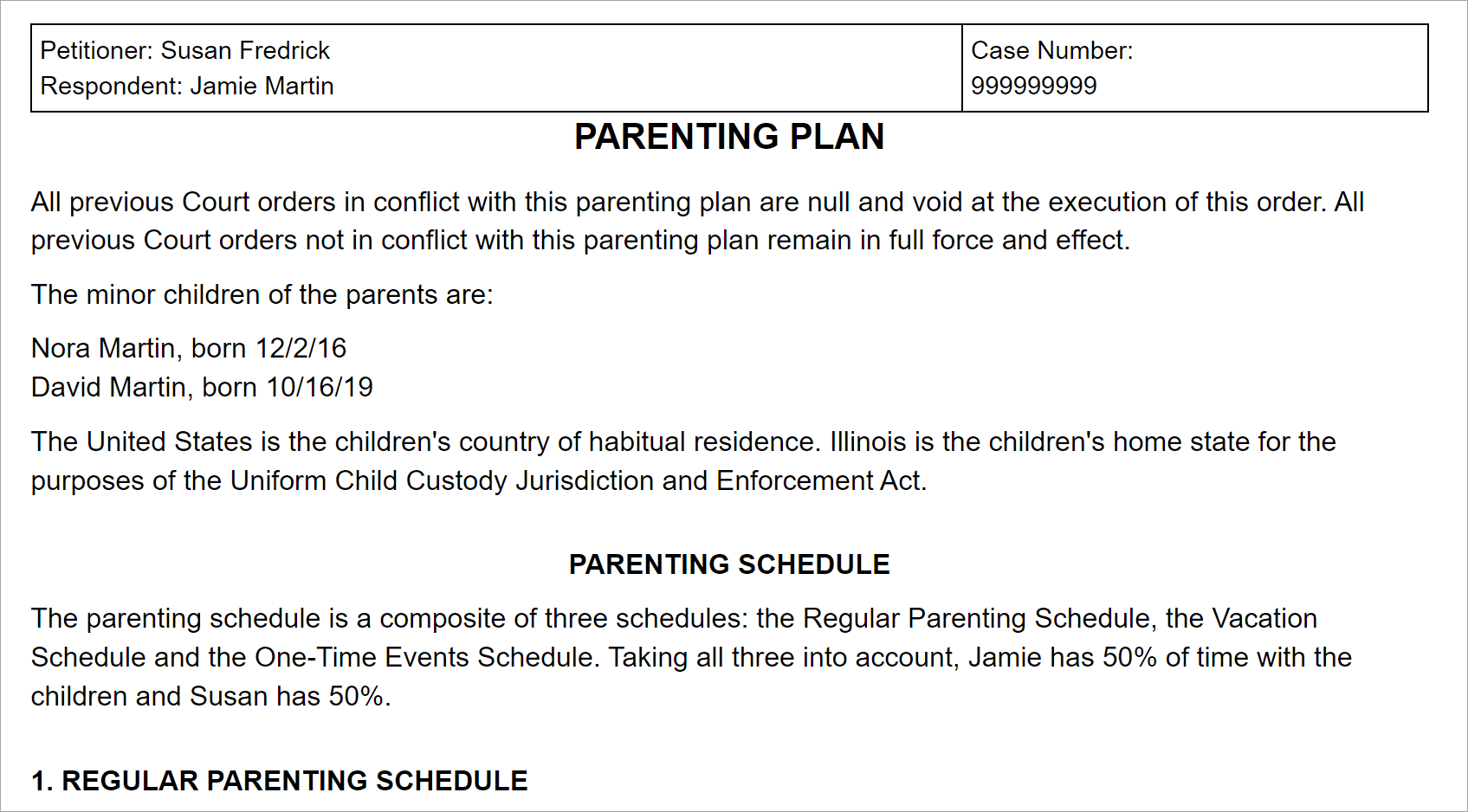
Parenting plans (sometimes called custody agreements in other states) outline how parental responsibilities and parenting time will be shared or divided.
Each parent must submit a proposed plan within 120 days of their custody case's initial filing.

If parents agree on a plan, they can submit one together as part of a settlement. A judge will almost always approve a joint parenting plan, unless it doesn't serve the child's best interests.
If parents don't agree, a judge will consider elements from both proposed plans before issuing a final plan as a court order.
You can create your parenting plan with the Custody X Change template, the Illinois parenting plan form or a combination of the two.
Visualize your schedule. Get a written parenting plan. Calculate your parenting time.
Your plan must list the children involved and their primary addresses. It must also list the parents, along with their home and work contact information.
In addition, you must include the following information for a judge to approve your plan:
A parenting plan must state whether significant decisions about the child will be made by both parents (shared parenting responsibility) or one parent (sole parenting responsibility).
In the case of shared responsibility, awarded far more commonly, your plan must specify who can make decisions about the child's:
Sole responsibility is usually only awarded if one parent has no interest in caring for the child or cannot care for them.
A parent with no parental responsibility can still make minor and emergency decisions when the child is in their care.
Your plan must also detail when parents will spend time with the child, in the form of a parenting time schedule.

In the vast majority of cases, parents have shared parenting time. The parent with more time is called the primary parent, while the other is the nonprimary parent. If parents split time equally, their plan must designate one as the primary parent for legal purposes.
The court will rarely award sole parenting time — usually only if the other parent doesn't want time with the child. Even parents with histories of crime, violence, substance abuse, etc. usually have visits, possibly as supervised parenting time.
Keep in mind that your parenting time impacts your child support payments.
You need to include a provision stating that parents will attend mediation or parenting coordination if one doesn't follow the parenting plan or if they can't agree on a change to the plan.
For mediation, indicate how many sessions parents will attend before proceeding to court if they still can't agree.
If neither mediation or coordination makes sense due to a history of abuse or because one parent has all decision-making power, state this in your plan instead.
A parenting plan must detail how to handle relocation.
Include a provision requiring parents to give each other notice at least 60 days before relocating (or as early as possible when 60 days is not feasible).
You can also define an area that parents must live within unless they get approval from the other parent or a court to relocate elsewhere.
Courts encourage parents to include as much further detail as possible. To avoid later stress and confusion, try to think of all potential disagreements, then say in your plan exactly you'll handle them.
Below are some common provisions to consider. You'll find over 140 like these in the Custody X Change parenting plan template.
Plans should specify where and how exchanges will take place. Should they take place in a neutral location? Who will transport the child?
Some plans detail what to do if a parent needs child care for more than 24 hours. If you include a right of first refusal in your plan, the scheduled parent must offer to let the other parent take the child. Specify how long the unscheduled parent has to respond to the offer (often two hours).
Plans should indicate how the child can communicate with a parent outside of scheduled parenting time. Are phone calls, emails, texts and video chats acceptable? How often and for how long? Specify that the other parent should not unreasonably monitor or interrupt these conversations.
While the state's parenting plan template covers a lot of important information, it doesn't know your family's circumstances. To ensure your child's needs are fully addressed, make sure to add custom provisions or build your own plan.
Custody X Change enables you to do both. In the app, you can choose from over 140 provisions (as well as enter your own) to create a document that can attach to the Illinois template or stand alone.

In the end, you'll be glad you made a thorough plan that will work for you and your child for years to come.
Visualize your schedule. Get a written parenting plan. Calculate your parenting time.